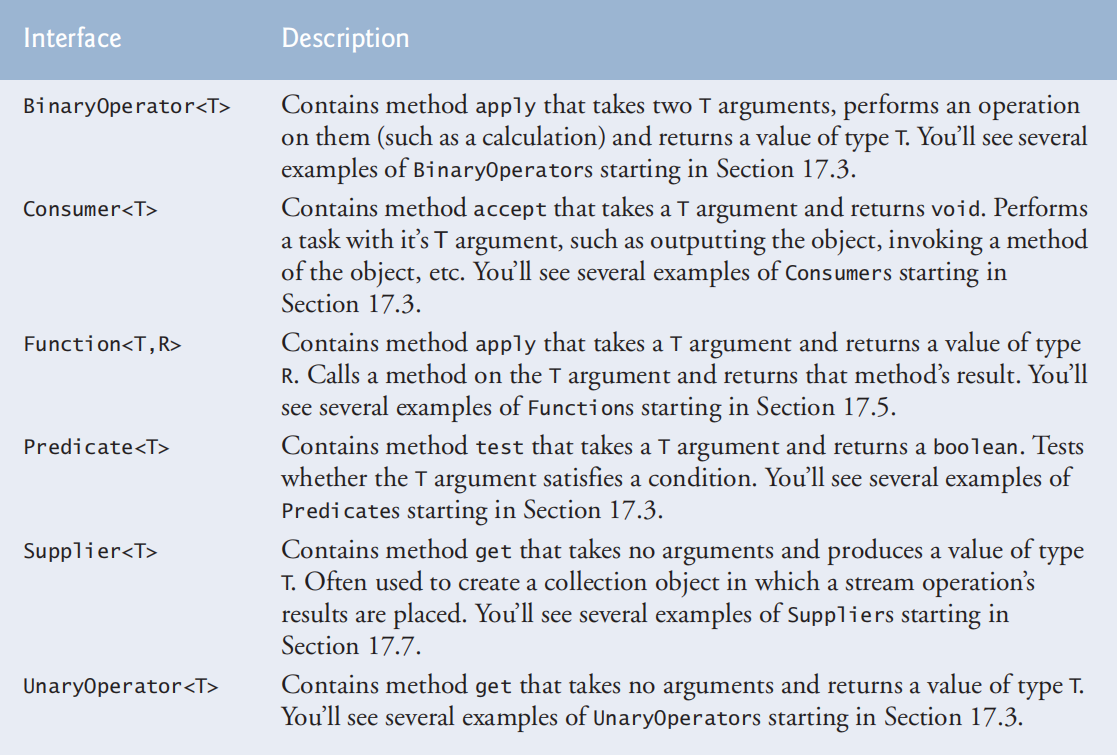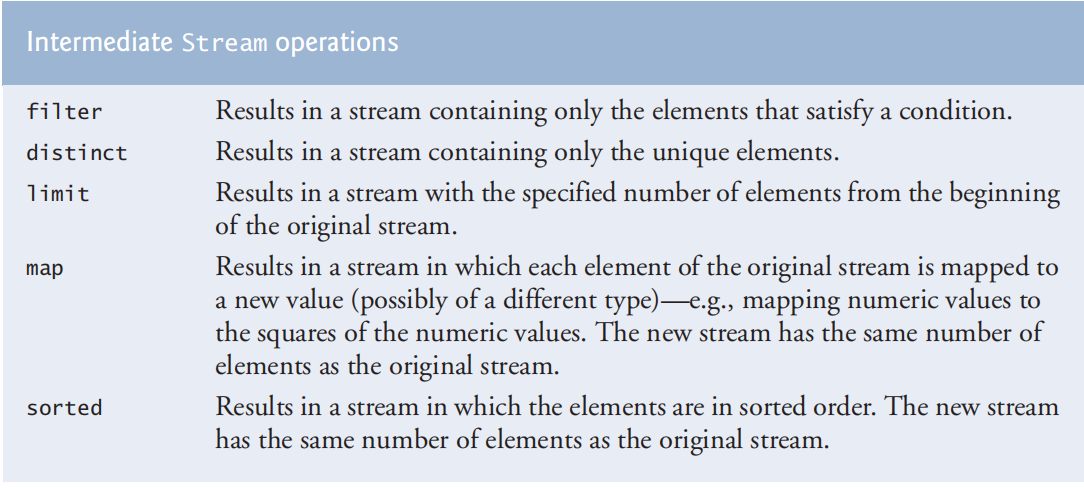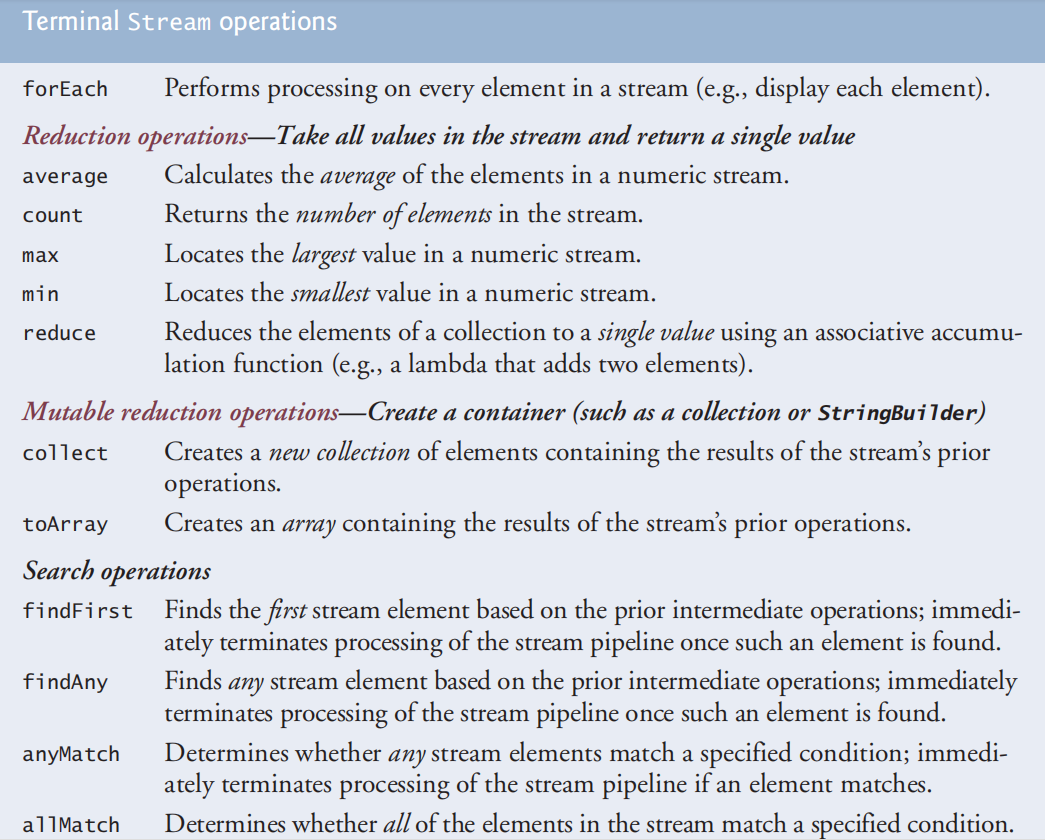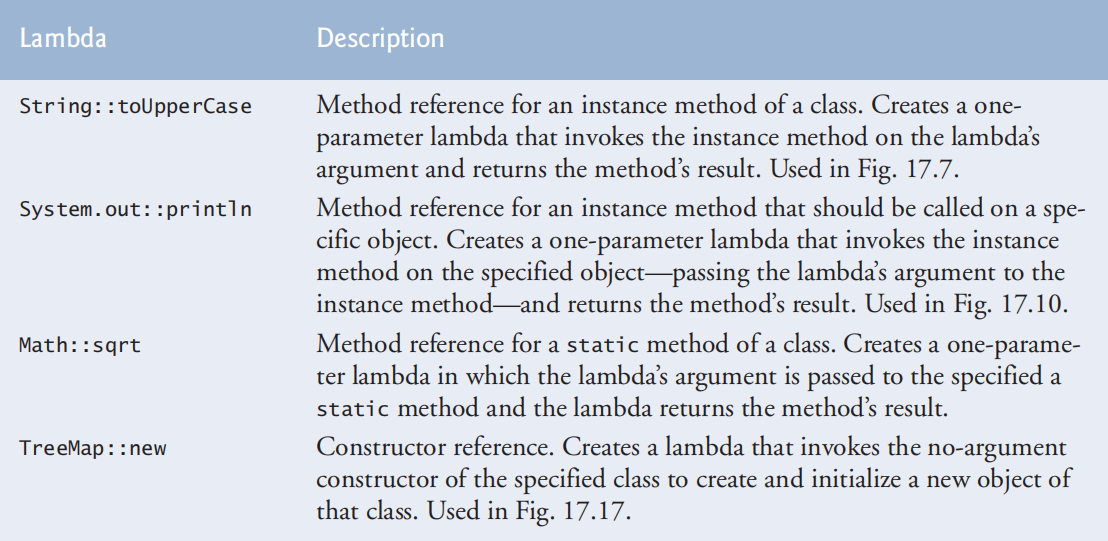Lambda表达式和流
函数接口
实现函数功能的接口

Lambda 表达式
语法
1
| (parameterList)->{statements}
|
例如:
1
2
3
4
5
6
| (x, y)->{return x+y;}
(x, y)-> x + y
value->System.out.println(value)
()->System.out.println("hello world!")
|
Streams类
在Java中,Streams类实现了Stream接口。流可以用来加工和传递数据。
使用流的好处:
Java 8 中的 Stream 是对集合(Collection)对象功能的增强。
它专注于对集合对象进行各种非常便利、高效的聚合操作(aggregate operation),或者大批量数据操作 (bulk data operation)。
Stream API 借助于同样新出现的 Lambda 表达式,极大的提高编程效率和程序可读性。
它提供串行和并行两种模式进行汇聚操作,并发模式能够充分利用多核处理器的优势,使用 fork/join 并行方式来拆分任务和加速处理过程。
通常编写并行代码很难而且容易出错, 但使用 Stream API 无需编写一行多线程的代码,就可以很方便地写出高性能的并发程序。所以说,Java 8 中首次出现的 java.util.stream 是一个函数式语言+多核时代综合影响的产物。
Stream Pipelines
流在移动数据的时候加工里面的元素,称之为管线。它不像Collections可以保留数据,原始数据被加工后就无法重新使用了。
Intermediate operation是懒惰的,它直到Terminal Operation被调用后才会执行,即不会改变流的状态,可以继续被其他的Operation调用。

而Terminal Operation是饥渴的,它会加工中间操作然后产生一个结果,这时流已经被破坏而不能使用了。
例如:
1
2
3
| IntStream intStream = IntStream.of(values);
intStream.reduce(0, (x, y), x + y);
intStream.reduce(0, (x, y), x + y);
|

实例1:使用IntStream Operations来简化Arrays和ArrayList
1
2
3
4
5
6
7
8
9
10
11
12
13
14
15
16
17
18
19
20
21
22
23
24
|
int[] values = {1,2,3};
IntStream.of(values).forEach(value->System.out.printf("%d ", value));
Arrays.toString(values);
fori;
IntStream.of(values).count();
IntStream.of(values).min().getAsInt();
IntStream.of(values).max().getAsInt();
IntStream.of(values).reduce(0, (x, y)-> x+y);
IntStream.of(values).sum();
fori;
IntStream.of(values).filter(value->value % 2 == 0).map(vakye->value * 10).sorted().forEach(value->sysout(value));
IntStream.range(1,10).sum();
|
实例2:使用Stream< Integer > Manipulations来处理Integer[]
1
2
3
4
5
6
| Integer[] values = {1,2,3};
Arrays.stream(values).collect(Collectors.toList());
Collections.addAll(arrayList, values);
Arrays.stream(values).filter(value->value > 4).sorted().collect(Collectors.toList());
|
实例3:使用Stream< String > Manipulations简化Strings, Characters 和 Regular Expressions
1
2
3
4
5
6
7
8
| String[] strings = {"red", "blue", "yellow"};
Arrays.stream(strings).map(String::toUpperCase).collect(Collectors.toList());
System.out.println(Arrays.stream(strings).map(s->s.toUpperCase()).collect(Collectors.toList()));
Arrays.stream(strings).sorted(String.CASE_INSENSITIVE_ORDER).collect(Collectors.toList());
|
String::toUppercase 是一个方法引用,相当于把参数的表达式省略了,但实际上依然是使用具体的实例来引用方法。
其他的方式如下:

1
2
3
4
5
6
7
8
9
10
11
12
13
14
| Employee[] list;
String toString();
list.stream().forEach(System.out::println);
list.stream().forEach(obj->sysout(obj));
Predicate<Employee> fourToSixThousand = e -> (e.getSalary() >= 4000 && e.getSalary() <= 6000);
list.stream().filter(forToSixThousand).sorted(Comparator.comparing(Employee::getSalary))
.forEach(System.out::println);
list.stream().filter(fourToSixThousand).findFirst().get());
|
函数变量和多领域比较
1
2
3
4
5
6
7
8
9
10
11
|
Function<Employee, String> byFirstName = Employee::getFirstName;
Function<Employee, String> byLastName = Employee::getLastName;
Comparator<Employee> lastThenFirst = Comparator.comparing(byLastName).thenComparing(byFirstName);
list.stream().sorted(lastThenFirst).forEach(System.out::println);
list.stream().sorted(lastThenFirst.reversed()).forEach(System.out::println);
|
使用map和distinct来产生唯一元素:
1
| list.stream().map(Employee::getLastName).distinct().sorted().forEach(System.out::println);
|
groupingBy方法对对象进行分类
1
2
3
4
5
6
7
8
9
10
11
12
13
14
15
16
17
18
19
20
21
22
23
24
25
26
27
28
29
30
31
32
33
34
35
36
37
38
39
40
41
42
43
44
45
46
47
48
49
50
51
52
53
54
55
56
57
58
59
60
61
62
63
|
public class Solution {
public static class Person{
private String name;
private int age;
public Person(String name, int age) {
this.name = name;
this.age = age;
}
public String getName() {
return name;
}
public void setName(String name) {
this.name = name;
}
public int getAge() {
return age;
}
public void setAge(int age) {
this.age = age;
}
@Override
public String toString() {
return "Person{" +
"name='" + name + '\'' +
", age=" + age +
'}';
}
public String byAgeRange(){
if(getAge() <= 59){
return "<=59";
} else if(getAge() == 100){
return "100";
} else {
int ten = getAge() / 10;
return String.format(ten + "0~" + ten + "9");
}
}
}
public static void main(String[] args) {
Person[] perons = {
new Person("chen", 10),
new Person("wen", 78),
new Person("shu", 100),
new Person("guo", 31)
};
List<Person> list = Arrays.stream(perons).collect(Collectors.toList());
list.add(new Person("fan", 65));
Map<String, List<Person>> groupByName = list.stream().collect(Collectors.groupingBy(Person::byAgeRange));
System.out.println(groupByName);
}
}
|
输出结果:
1
| {100=[Person{name='shu', age=100}], 60~69=[Person{name='fan', age=65}], 70~79=[Person{name='wen', age=78}], <=59=[Person{name='chen', age=10}, Person{name='guo', age=31}]}
|
将结果映射成double类型
1
2
| list.stream().mapToDouble(Employee::getSalary).reduce(0, (value1, value2)->value1 + value2);
list.stream().mapToDouble(Employee::getSalary).average().getAsDouble();
|
实例4:从文件中创建字符流
1
2
3
4
5
6
7
8
9
10
11
12
13
14
15
16
17
18
19
20
21
22
23
24
25
26
27
28
29
30
31
32
33
|
import java.io.IOException;
import java.nio.file.Files;
import java.nio.file.Paths;
import java.util.Map;
import java.util.TreeMap;
import java.util.regex.Pattern;
import java.util.stream.Collectors;
public class StreamOfLines {
public static void main(String[] args) throws IOException {
Pattern pattern = Pattern.compile("\\s+");
Map<String, Long> wordCounts =
Files.lines(Paths.get("src/main/resources/test.txt"))
.map(line -> line.replaceAll("(?!')\\p{P}", ""))
.filter(line -> line.compareTo("") != 0)
.flatMap(line -> pattern.splitAsStream(line))
.collect(Collectors.groupingBy(String::toLowerCase,
TreeMap::new, Collectors.counting()));
wordCounts.entrySet()
.stream()
.collect(
Collectors.groupingBy(entry -> entry.getKey().charAt(0), TreeMap::new, Collectors.toList()))
.forEach((letter, wordList) ->
{
System.out.printf("%n%C%n", letter);
wordList.stream().forEach(word -> System.out.printf(
"%13s: %d%n", word.getKey(), word.getValue()
));
});
}
|
实例5:使用流来统计随机结果
1
2
3
4
5
6
7
8
9
10
11
12
13
14
15
16
17
18
| import java.security.SecureRandom;
import java.util.function.Function;
import java.util.stream.Collectors;
public class RandomIntStream {
public static void main(String[] args) {
SecureRandom random = new SecureRandom();
System.out.printf("%-6s%s%n", "Face", "Frequency");
random.ints(600_000, 1, 7)
.boxed()
.collect(Collectors.groupingBy(Function.identity(),
Collectors.counting()))
.forEach((face, frequency) ->
System.out.printf("%-6d%d%n", face, frequency));
}
}
|
注:Java不允许原始数据放入集合中,而infinite stream(比如IntStream)的元素个数是未知的,因此需要使用boxed将其转换为Stream< Integer >。



